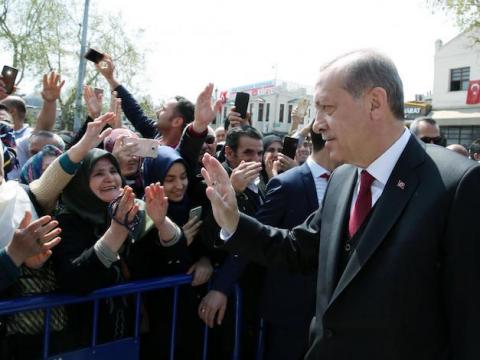What critics claim is the openly fraudulent Turkish referendum ends parliamentary democracy in the country and gives President Recep Tayyip Erdogan dictatorial powers. The most unexpected aspect of the poll on Sunday was not the declared outcome, but that the ruling AKP (Justice and Development Party) allegedly found it necessary to fix the vote quite so blatantly.
The tightness of the final outcome of the referendum – 51.4 per cent “yes” to the constitutional changes and 48.59 per cent voting “no” – shows that the “no” voters would have been in the majority in any fairly conducted election.
Late on election day the head of the Electoral Board overseeing the process decided that votes not stamped as legally valid, numbering as many as 1.5 million, would be counted as valid, quite contrary to the practice in previous Turkish elections. An even cheekier ploy was to announce that cities with large Kurdish populations in south-east Turkey, where Erdogan’s security services have brutally crushed dissent, had swung in his direction.
Turkey's president Recep Erdogan wins referendum to greatly expand powers
These possible signs of fraud come in addition to the detention of journalists, MPs and activists and the takeover or closure of almost 150 media outlets. Some 145,000 people have been detained or arrested and a further 134,000 sacked for alleged links to the attempted military coup on 16 July 2016 which is the excuse for a purge in which anybody suspected of dissent is targeted as “a terrorist”. Erdogan already holds arbitrary power under a state of emergency under which parliament, the judiciary and other power centres will be brought under the full control of “an executive presidency”.
All of this will be familiar to anybody familiar with the toxic politics of one party or monarchical states anywhere in the world. Syrian elections to this day and Iraqi elections up to 2003 invariably returned overwhelming majorities in favour of their regimes and some found it a mystery why their rulers bothered to hold a vote at all. The answer was that the vanity of autocrats is bottomless and they want to see reports in their state-controlled media that they and their policies are the people’s choice. A subtler and more menacing message is to demonstrate their ability to force their people to perform an electoral kow-tow as a demonstration of raw power and to show the world who is in charge.
In the past foreign observers have often made the mistake of thinking that Turkey was similar to Middle East states. In reality, it was a much more modern state closer in its political history to the countries of southern Europe. There were military coups and military rule, but there were also real elections and powerful parliaments. There was a sophisticated and influential media and an intellectual energy in Turkey superior to most countries in Europe. It is this that is now being eliminated as Turkey becomes yet another member of the corrupt and tawdry club of Middle East autocracies.
The manipulation of the referendum results, claimed by the opposition, is in sharp contrast to the conduct of past Turkish elections which were generally fair. Parts of the process remained legitimate, as witness the majority of “no” votes Istanbul, Ankara and Izmir, the three biggest Turkish cities. This was an encouraging show of independence by voters and their representatives in the face of relentless pressure from the authorities to vote “yes”. No act of revenge is too petty or cruel: In one case an opposition MP, who denounced the “yes” voters, found that in retaliation his 88-year-old mother had been discharged from a hospital where she had been under treatment for two-and-a-half years.
Opponents of Erdogan are taking comfort in the thought that a “stolen” election will not legitimise his rule and can be challenged in the courts. But people in the business of establishing authoritarian rule and taking over the judiciary are not going to be deterred by such quibbles. In addition, the leaders of opposition political parties are incompetent, rendered ineffective by state persecution or, as in the case of the pro-Kurdish HDP, in jail awaiting long sentences.
The narrowness and dubious nature of Erdogan’s electoral “success” is unlikely to make him more conciliatory and, going by his actions after failing to get the majority he wanted in a general election in 2015, he will become even more aggressive in stamping out opposition. He is already proposing to bring back the death penalty which scarcely argues any appetite for compromise on his part. Resistance to his rule, deprived of any effective legitimate vehicle for protest through parliamentary politics, may become more violent, but he can use this to demonise all dissent as “terrorism”.
Yet it will be difficult for Erdogan to stabilise his country because he has previously specialised in provoking crises, such as the Kurdish insurgency since 2015 or Turkey’s role in the war in Syria, which supposedly necessitate a strong leader such as himself.
Authoritarian rulers often get away with such justifications for their monopoly of power, particularly if they have full control of the media in their own country. They can deal with domestic opponents by unleashing the security arm of the state against them. The real danger to their rule is when their foreign and domestic enemies combine against them.
Erdogan tried to whip up Turkish nationalist feeling during the election campaign, by carefully-staged theatrical rows with the Netherlands and Germany. But Turkey is surrounded by many actual or potential enemies – Syrian, Kurdish, Iranian, Russian – who see how easy it will be to exploit and exacerbate the country’s hatreds and deep divisions.


Spread the word